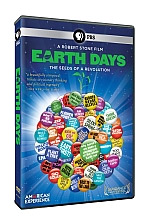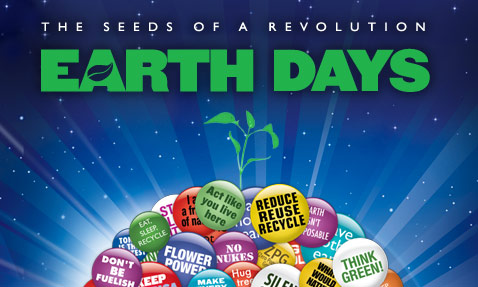Earth Days – A Documentary Film About The Environmental Movement
For a limited time, you can watch Earth Days for free on the PBS website. Click here to view the film NOW!
The problem with environmentalism is that it tricks people into believing that in order to make change in the world, you (as the individual) need to have less, be less, do less and live a less extraordinary life. This misconception turns people off. Few people will ever rally behind a lifestyle of diminished plenitude. We all strive for more, better, and improved ways of living. Yet, because the idea of increased wealth, for so many individuals, is not in any way aligned with the idea of living a co-existent lifestyle with the planet, it is easier for the individual to dismiss the environmental movement as a fad, a passing thought, or even a weight meant to drag their current lives to a level of lesser opulence than that of what they are currently experiencing. And so it is that the environmental movement has struggled for the past forty+ years.
On the evening of April 15th, 2010 I had the great pleasure of attending a private screening of the film Earth Days, a two-hour documentary about the history of the environmental movement.
Like you, I imagine, I’ve seen quite a few films about the environment, global warming, and the destruction of our natural eco-centers. But never before have I seen a film that so well captures the ideas, the people, and the decades of struggle for environmental change that have occurred here in the United States.
Earth Days is a story told through the eyes of nine “divergent witnesses, including a secretary of the interior, Stewart Udall, who actually cared about the environment; a biologist, Paul Ehrlich; a congressman, Pete McCloskey; and an astronaut, Rusty Schweickart.” Through the stories told by these nine individuals, the viewer comes to see Earth Days not as just another “save the planet documentary,” but instead as a powerful depiction of the awakening of the world to environmental reality.”
Earth Days further cemented within me the idea that environmental change does not have to come at cost to my way of living – but instead, that there are likely ways to live an incredible lifestyle that are also very much in tune with the planet.
 Some Highlights From The Film
Some Highlights From The Film
The most interesting part of Earth Days, for me at least, was the revolving discussion around the continual increase of human population. Over the past forty years, the population on planet earth has doubled and then tripled and continues to grow on a daily basis. This constant increase in population brings with it an increase in demand for food and an increase in demand for material goods and products. The problem with this of course, is that there are only so many natural resources to go around. There is only so much food that can be grown, so many trees that can be harvested, and so much oil that can be drilled. So you see, for many of the characters featured in the Earth Days documentary, the ability to stop environmental downfall is as simple as reducing the number of children each couple gives birth to in their lifetime. One woman featured in the film, goes so far as to use her college commencement speech as an opportunity to pronounce that in an effort to make positive change in the world, she would never had a child. Forty+ years later, she has held to that commitment.
Another point that Earth Days drilled home for me was the idea of happiness. After viewing the film and looking very much at my own life, I realize that many of us have been led to believe that by gaining more physical goods, we will in turn become happier ourselves. But Earth Days shines a light on the fact that people living fifty years ago were no less happy than we are today. While technological output has increased by leaps and bounds, the general satisfaction of our population remains nearly equal. As they say in the trailer above, “Economists have shown that once you have your basic needs met, further economic growth and consumption doesn’t supply any more satisfaction.”
Finally, the film really points the finger at our leaders and drills home just how much of a role they play in the current environmental movement. Earth Days looks especially at Nixon and Reagan, who, whether they knew it at the time or not, played vital parts in either improving the nation’s ecological policies or pushing them backward by years and years. While I wish our leaders always had the environment and the people’s best interests at heart, the truth of the matter is that politics, money and influence still play a key role in the reason why positive environmental change is taking so long.
If you have not yet seen Earth Days and you care even the slightest bit about our planet and our future generations, I encourage you to watch it. But watch it with a friend, talk about the film afterward, and come up with some ideas for what you can do to make eco-friendly living a part of your everyday life.
Click here to get yourself a copy of Earth Days on DVD or Blue-Ray.

